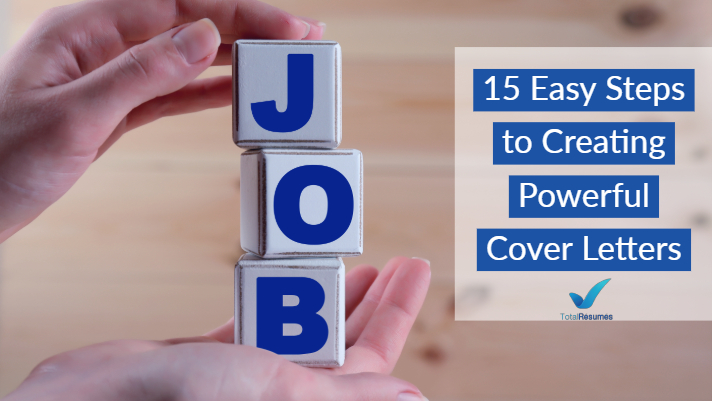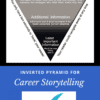
****************
How can something so seemingly unimportant be so powerful?
What is a cover letter?
What’s the importance of using one?
****************
It seems silly to examine such a simple question like the purpose of a cover letter. Yet, so many jobseekers question whether to use a cover letter in the first place, so sure, let’s review the basics so you fully understand the “power” a cover letter holds. Without a doubt, a cover letter further connects you and your resume to an employer – it’s just that simple.
There are three principal reasons for always including a cover letter:
1. Firstly, the employer expects to see it, even if they didn’t ask for it.
2. Secondly, a cover letter is your first and best opportunity to present a customised, personal message to the person examining your application or resume. Your cover letter, however, gives you an opportunity to take a few sentences to put your best foot forward and to emphasise whatever skills or unique abilities you have that make you the right choice for the job.
3. Finally, a cover letter is your chance to “sell yourself” to the employer. Beyond listing your specific talents or skills, the cover letter lets you somewhat present the kind of person you are that a resume simply cannot convey.
Here are 15 easy steps you can apply when creating your cover letters:
Cover Letter Help Tip #1: Always introduce your resume with a cover letter.
Although not stated in an ad or mentioned in conversation, an employer likely wishes to see a cover letter accompanying your resume. True, not all employers share the same views on cover letters and therefore can’t all be put in the same barrel of opinion. But, there’s a certain degree of risk when the employer expects a cover letter but doesn’t receive one. Let’s face it, the cover letter serves as a chance for you to sell yourself further— even if only a tiny bit more. A resume lists what you’ve done, sure, yet the cover letter lets you further tailor your message to each cover letter recipient. For example, what can you do when employers seek a specific skill you haven’t done for a while? Highlighting your knowledge of the skill within the resume can sometimes be tricky, while introducing it within a cover letter can be much easier. So, leverage your cover letter to introduce and reinforce your value to employers
Cover Letter Help Tip #2: Cover letters are a snapshot of you as a potential employee.
The importance of first impressions is clear when it comes to cover letters. In just a few paragraphs, you’ll present your communication skills, your attention to detail, your interest in the company, and let’s not forget your qualifications that are perfect for the job. A cover letter is also a great place to shine a bit of your personality too. Not sure what details to snapshot in your cover letter? Start by making a list of the top 10-20 components of your professional value and cross-reference that list to what the employer seeks. Your professional value, plus employer’s wants/needs, equals a great snapshot of you in a letter. Voila!
Cover Letter Help Tip #3: A cover letter helps set you apart from other applicants.
A resume by itself can be limiting; but when paired with a cover letter, both documents serve as a highly effective tag team. Consider this: An employer has a large number of applicants to review, yet he or she can take only seconds to consider each candidate. By knowing what is useful to the employer and calling attention to that in your cover letter, for example, you help quickly answer the question, “Why should I hire this person?” Focus the letter not only on your skill set, but also consider including details on how you can help the employer with what *pains* them.
Cover Letter Help Tip #4: Don’t use a form letter.
You can find many books, websites, and other guides with hundreds of sample cover letters. Use them as a starting point to help you get ideas for format and content, but don’t copy them. Write your cover letter in your own words so it has your voice and style. Take the time to research the company and convey your own enthusiasm for the job. A bland, generic cover letter says that you didn’t care enough about the position or the employer to expend any effort creating a specific and detailed letter.
Cover Letter Help Tip #5: Cover letters should be actual letters.
A cover letter is supposed to be brief, readable, and professional. A fax cover sheet or a handwritten note should preferably never be used, especially when you want an employer to view you as a serious potential employee. The ideal cover letter is four to five paragraphs long, with each paragraph consisting of maybe three or four sentences. Keep in mind, too, that “less is more.” Your letter should preferably be no more than one page in length. Write clearly and concisely, and stay focused in each paragraph.
For example, one could use the following for writing an amazing cover letter:
1) write one or two sentences to introduce the purpose of your contact;
2) write a second paragraph to highlight your relevant skills and work experience;
3) write a third paragraph to outline academic credentials and relevant certifications;
4) write a quick paragraph outlining salary requirements (include such a paragraph only in response to a querying employer, of course); and lastly …
5) write a closing paragraph that reminds the reader how to reach you.
Cover Letter Help Tip #6: Don’t tell your life history or repeat your resume.
A cover letter is nothing more than a sales tool designed to pique an employer’s interest in you. Focus your letter content on the parts of your resume that are relevant to the position – the qualifications that best help an employer decide why you should be hired for the job. Including irrelevant information, even if you think it makes you seem more impressive, wastes valuable letter “real estate.” If you’ve written an effective cover letter, the employer will want to take more time to read through your resume and learn about the things you left out.
Cover Letter Help Tip #7: Set the proper tone for your employment history.
If you are currently employed, you don’t need to explain in the cover letter why you are looking for a new job – you’ll have time to do that in the interview. If there is a gap in your employment history, give a brief explanation of the reason so that the employer isn’t left wondering; again, you can elaborate more in the interview if necessary. No matter what your current job status, though, don’t come across as desperate. Be enthusiastic about why you want this job and why you are the perfect fit for the employer.
Cover Letter Help Tip #8: Don’t emphasize your weaknesses.
It might be tempting to call attention to something that might not be a good fit, in the belief that bringing it up lets you deal with potential employer objections. Statements like “Even though I don’t have any related experience…” or “I may not have the educational background you seek…” have no place in a cover letter. Don’t emphasize your flaws. Instead, point out all of your strengths – skills, experience, knowledge of the company, and so on. An employer might take a chance on someone who’s lacking in one area if they meet all other criteria.
Cover Letter Help Tip #9: Use action words, not wimpy phrases.
Your cover letter should show that you are strong, capable and enthusiastic. Use action verbs, not the passive voice, as often as you can. For example, instead of writing “I was the Department Supervisor,” write “I supervised a staff of six people.” Here, you can find a list of action verbs on the Internet. Also, avoid using phrases like “I feel” or “I believe.” Stronger qualifiers such as “I am positive” or “I know” convey determination and spirit. Select words that demonstrate your abilities and show your enthusiasm — and your passion — for your work.
Cover Letter Help Tip #10: Research the company.
You want your potential employer to know that you contacted them for a reason – their business is where you want to work. Research the needs, values and goals of the company. Who are its major clients? What is its history? What trends can you identify in product lines or acquisitions? This information helps you sell yourself in terms of how you can add value to the company … and it shows that you took the time to learn a bit more about them before applying. Be sure to verify any information you include in your cover letter.
Cover Letter Tip #11: Research the industry.
Don’t even start writing your cover letter until you’ve spent some time in research, beginning with the industry in which you want to work. Knowing some basic information about the industry will help you write cover letters for any job within that industry, with a simple tweaking to add a specific employer reference. Check out the Internet or your local library for websites, trade newspapers and industry magazines, and learn about key business trends, popular terms, technological developments and current business news. This will give you background information that you can then
tailor to each specific company.
Cover Letter Tip #12: Tailor your letter to the specific company and to the specific position you seek.
An employer won’t read a cover letter that looks like it was sent to every company in the industry. Be sure you both specify the position you’re seeking (or if it’s a generic inquiry letter, the type of work you want to do) and include details that show your knowledge about the company and how you can meet its needs. An employer wants to see applicants with a real interest in the company, enthusiasm, and proper qualifications. You can’t communicate that in a generic cover letter.
Cover Letter Tip #13: Ideally, address your letter to the person who will hire you.
Try to find out the name and title of the person who will make the hiring decision, and address the letter specifically to that person. Often you can call the company’s human resources or personnel department and ask for that information, or just ask the receptionist. LinkedIn, the library, phone book or the Internet can also be helpful. If you can’t find anything out, then a salutation such as “Dear Hiring Manager” is better than the generic “To whom it may concern.” Be sure to spell the name and title correctly.
Cover Letter Tip #14: Make that first paragraph worth reading.
Every line of your cover letter is important, but none more so than the first paragraph. A boring, generic first paragraph is almost guaranteed to make an employer move on to the next letter. Grab his or her attention right away with a few well-crafted sentences that tell why you are interested in this particular company and summarize your qualifications (which you’ll expand on in the rest of the letter). If you intrigue the employer at the start, he or she is much more likely to read the rest of your letter and resume.
Cover Letter Tip #15: Use the fourth paragraph to request the next step.
In your fourth paragraph, don’t end with a lacklustre phrase such as “I look forward to hearing from you.” Be proactive and request the next step. If you are interested in scheduling an interview, say so … and then tell the employer that you will follow up in a specified period of time. Give information about where and when you can be contacted if the employer wants to call you first to schedule or needs more information or mention when you’ll be in town if you live out of the area.
Finally, make a follow-up call when you say you will.
Even though you have invited the employer to call to schedule an interview, be sure you follow up with a phone call within the time specified in the cover letter (two weeks is common). This holds true whether you are responding to a specific job advertisement or just inquiring about available positions. You want to be sure that at the very least your materials were received. This may not be possible if the ad has specified “no phone calls” or if you’re responding to a blind-box ad, but do your best.
Having a great cover letter puts you one step closer to an interview. Some jobseekers don’t take the time to mess with writing cover letters, and thankfully, you’re not one of those people. Actually, those job competitors who fail to write cover letters are actually tipping the scales in your favour… though they might not know it. Although your cover letter may be bound for the trash, you’ve in some way increased your chances for an interview, mainly because you took the time to write something the interviewer will need to touch (and possibly skim) before hitting that delete key, or dropping your letter in the trash. If anything, a cover letter is an obstacle that makes the letter’s recipient pause, even if only for a brief second.
Good luck to you!
P.S. If you need help with creating a stand-out letter, contact Carolyn today!

